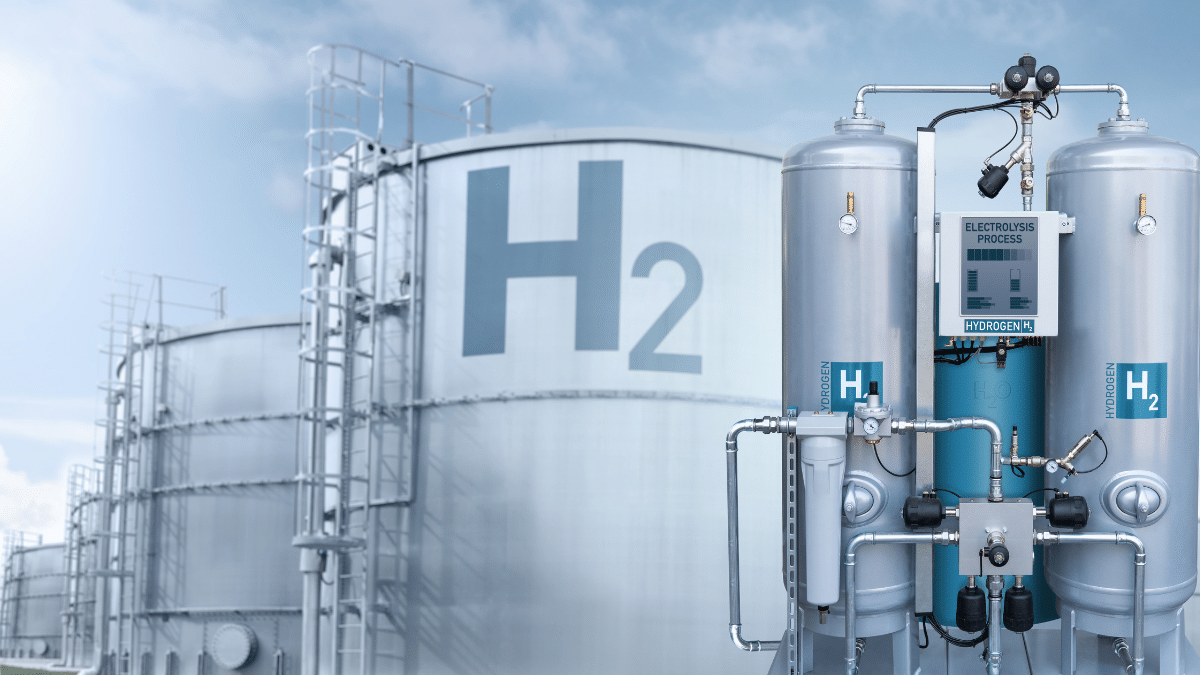Hydrogen as the fuel of the future, battery energy storage and the dynamic development of the power market in Poland – these are the foundations of the modern energy industry. Dariusz Pachniewski, an expert with more than 30 years of experience, analyzes the current state of the industry, investment opportunities, legislative support and the directions in which the energy transition is heading in Poland and Europe. Is it time to bet on energy storage and hydrogen technologies?
Interdependence of Energy Storage and the Hydrogen Industry
The energy storage industry is inextricably linked with the hydrogen industry, as we view hydrogen as a future energy storage medium – the fuel of the future, an energy carrier to power the entire modern economy, and a raw material for further technological transformation processes critically needed by the economy to fulfill the Fit for 55 package, or simply to create a cleaner world than today. This is a priority for me as someone building such an economy, as well as for our entire country and the EU. Battery energy storage systems are permanently connected to building this economy, as they help in optimal electricity management.
State Support for Energy Storage
The Polish State supports the development of battery energy storage by providing assistance through integration into the capacity market. These actions enable an entity implementing such projects to count on state support for several years, making such a business attractive to banks. Individual and structural investors are entering this market segment. The “Capacity Market Time” will not last forever. This support offer is time-limited. One must design such a storage facility, lease the land, obtain connection permits, go through certification, win an auction, and finally build it. Only then can one think about further business actions, such as selling or using it according to the business plan that includes multi-year state support.
Business Opportunities in the Capacity Market
Promising opportunities include utilizing Polish legal provisions that support business energy storage operating in the capacity market over several years. As I mentioned earlier, one must act now to “get into this market game”. There is a race to see which company will build the largest energy storage or the most storage facilities. The time constraints are approximately one and a half years.
Energy Storage Functions in Different Countries
In other countries, the capacity market does not function, and energy storage facilities serve systemic functions beyond their normal role, such as precise frequency regulation of the power grid. This makes the “Polish Capacity Market System” and the construction of storage facilities – both small (up to 10 megawatt-hours) and larger ones – particularly good and predictable.
Return on Investment in Energy Storage
Investment returns in energy storage are guaranteed through certification and winning auctions, as the state actively secures this business after the storage facility becomes operational. Additionally, one can participate in solutions involving energy sales when prices differ between day and night, guaranteeing additional profit. Hydrogen storage facilities have a return time of approximately 4 years. The larger the storage, the shorter the return time. Moreover, hydrogen storage can be used for external sales. Renewable hydrogen prices are high, and industry, transportation, and other economic sectors need it most, for example, as a replacement for gray hydrogen.
Energy Storage Industry Perspectives
I do not see risks in the energy storage industry, whether in battery or hydrogen form. There is a lack of hydrogen legislation, but work on this topic is ongoing. Everyone knows this is the future of an economy based on zero-emission energy carriers.
From Evolution to Revolution
In my opinion, the evolution will transition to a revolution because all market players will want to possess such solutions, and “first come, first served.”
Impact of Energy Storage on the Energy System
“Battery and hydrogen” storage facilities will guarantee a stable energy system – appropriately compensated and ensuring the use of hydrogen as a large-scale energy storage. Hydrogen in such storage will serve in achieving the country’s energy neutrality. Emerging regulations additionally favor these actions.
Energy Storage Legislation Status
Energy storage legislation is continuously developing in a positive direction. As I mentioned earlier, these actions are the basis for investors’ decisions to enter our market. Hydrogen legislation in the storage and distribution subsystem is in the negotiation phase, but basic concepts are already defined – such as hydrogen being an alternative fuel for transportation with an established quality standard – which is very important for fuel cell and energy turbine manufacturers.
Hydrogen Initiatives in Poland
In Poland, Hydrogen Valleys, energy clusters, shared energy systems, industry associations, and sector groups have been established. These actions are accelerating the development of the hydrogen economy. I am also a signatory to the hydrogen sector agreement organized by the Ministry of Climate and Environment and participated in task force work for hydrogen economy at the ministry. I was a member of four such working groups, including the group focused on implementing knowledge and personnel for future educational actions in the hydrogen economy. My educational activities were recognized, and I was awarded the title of Hydrogen Ambassador for the Young Mechanic Academy. This involves educating future young professionals who will work in the hydrogen economy as young technicians and later engineers.
Innovations in Energy Storage
A novelty is certainly the combination of battery energy storage with hydrogen storage in gaseous or liquid form – a so-called hybrid storage system connected to RES sources. The development of home energy storage and the law created to support it favors this technology.
Energy Storage Evolution
Battery energy storage is developing very dynamically in this decade. Previously, only “water energy” – pumped storage power plants – were considered energy storage. Now, these storage systems and hydrogen as an energy carrier are the future of storage. Therefore, investors closely observe the legislation of these storage facilities and allocate their capital for this purpose, treating such a business as a “safe capital investment”.
Potential of the Polish Energy Storage Market
It is estimated that the Polish market can easily accommodate at least several gigawatts of energy storage. The challenge is connection capacities – places where one can connect to the power grid. This problem will diminish over time as the electrical system in Poland undergoes modernization. The global market will increase the share of storage facilities. The ability to store energy in the right place and time and receive it at any moment is the future of energy.

Compliance with EU Directives
The Polish storage system is developing dynamically and is in line with EU directives in this area.
- Challenges in Energy Storage Development.
The primary challenges are the power grid, capital, and legislation keeping pace with new technological solutions. This can be addressed by increasing capital investments in these solutions – new investors are needed. - Importance of Knowledge and Competencies.
First and foremost, one must have knowledge and experience in this field. This economic sector is developing dynamically, but there is a shortage of people and capital. Human competencies are limited in this area. I strive to share my knowledge and experience, for example, by lecturing on hydrogen and RES technologies at recognized universities in Poland, such as the AGH University of Science and Technology in Krakow. I also participate as a speaker and moderator at meetings and conferences organized by recognized associations and organizations involved in building the hydrogen economy.
Role of International Cooperation
International cooperation is fundamental to this economic sector – as the influx of significant foreign capital and appropriate management personnel in Poland is synonymous with an investor’s business success. My team and our experience in these fields guarantee this.
Hybrid Technologies in the Polish Energy Mix
Hybrid energy storage technologies are integrated into the Polish energy mix as additional stabilization and a guarantee of seamless generation, transformation, storage, and energy distribution on demand (for the electricity system).
Market Potential and Development Perspectives
I want to convey that the market for such actions is enormous in Poland. Everything supports this – adopted EU packages and Polish law, the geopolitical situation, and a group of technology enthusiasts like myself, leveraging my thirty years of experience in the energy sector.

Dariusz Pachniewski
With over three decades of dedicated expertise in energy innovation, the professional has established himself as a distinguished expert in hydrogen technologies and sustainable energy development. In 2018, he contributed to the Parliamentary Commission "Hydrogen Poland", participating in strategic discussions in Brussels as an independent expert, demonstrating extensive knowledge in national energy transformation strategies. His professional competencies enable significant contributions to innovative energy projects at the national level. He is a recognized authority in hydrogen industry conferences, serving as an expert advisor, panel contributor, and session moderator. In 2020, he served as Board Advisor for Hydrogen Technologies and Renewable Energy Sources at Cyfrowy Polsat and ZE PAK, leading a pioneering project in Poland. This groundbreaking initiative focused on hydrogen production, storage, transportation, and distribution, including a 5 MW electrolyzer connected to a 50 MW biomass block and the development of two hydrogen refueling stations in Konin and Warsaw. Since March 2021, he has held the critical role of Spokesperson for Hydrogen Poland, representing the national hydrogen development agenda. His professional engagement includes active participation in working groups dedicated to promoting hydrogen integration into the national economic framework. Professional Contributions: Participated in developing the Polish Hydrogen Strategy across four critical domains: Hydrogen technology implementation in energy sector Alternative fuel development in transportation Hydrogen production in emerging installations Hydrogen education initiatives Served as a key signatory to the sectoral agreement for the Hydrogen Economy Appointed Hydrogen Ambassador for the "Young Mechanic Academy" in May 2021 Designated Hydrogen Ambassador for the EU Hyfinder organization in Poland His strategic involvement extends to foundational hydrogen economy initiatives, including the establishment of Energy Clusters and Hydrogen Valleys, consistently documenting and communicating these developments through specialized professional media channels. Previously serving as Business Development Director at "Hynfra", he was instrumental in pioneering hydrogen economy development in Poland. He continues to be a prominent participant in premier industry conferences, including H2poland, Impact21, National Energy Summit, Green Energy Congress, and numerous national and European economic forums. Since 2025, he has assumed the role of co-founder and president of Hydrogen Club Europa, further solidifying his leadership in the emerging hydrogen technology landscape.
